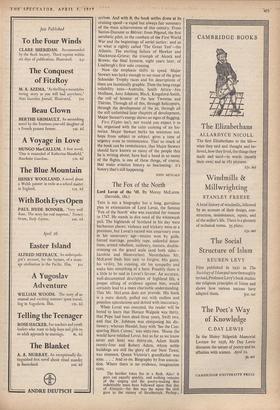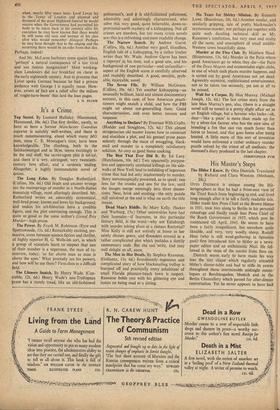The Fox of the North
Lord Lovat of the '45. By Moray McLaren. (Jarrolds, 18s.)
THIS is not a biography' but a long, garrulous plea in extenuation of Lord Lovat, the famous 'Fox of the North' who was executed for treason in 1747. He stands in dire need of the whitewash pail. The highlands of Scotland in his day were barbarous places; violence and trickery were at a premium, but Lovat's record was unsavoury even in his unsavoury age—estates won by guile, forced marriage, possibly rape, unlawful deten- tions, armed rebellion, outlawry, treason, double-
crossing • on the grand scale (and both sides—
Jacobite and Hanoverian). Nevertheless Mr. McLaren finds him easy to forgive. His gusto,
his virility, his cunning, stir his sympathy and make him something of a hero. Possibly there is a little to be said in Lovat's favour. An accurate, well-documented description of highland life, a proper sifting of evidence against him, would certainly lead to a more charitable understanding. This Mr. McLaren does, not provide. His book is a mere sketch, puffed out with endless and pointless speculations and dotted with inaccuracy.
When Lovat was executed, the reader will be bored to learn that Horace Walpole was thirty, that Pope had been dead three years, Swift two, and that Dr. Johnson was cbmposing his dic- tionary, whereas Handel, busy with 'See the Con- quering Hero Comes,' was sixty-two. 'Hume (he would have relished Lovat, but as far as we know never met him) was thirty-six, Adam Smith twenty-four and Robert Adam, whose noble buildings are still the glory of our Nevt; Town, was nineteen. Queen Victoria's grandfather was nine. . . .' And so on. Biography by free associa- tion. Where there is no evidence, imagination riots.
The heather takes fire in a flash. Alas! it goes out equally quickly, and nothing remains of the singing and the poetry-making that indubitably must have followed upon that day of Altnigoir—for this was the name the clan gave to the victory of Stratherrick. Perhap ;, when, nearly fifty years later, Lord Lovat lay in the Tower of London and planned and dreamed of the great Highland funeral he would receive when the Government had permitted his body to be taken back to his country after his execution he may have known that there would be still some old men and women of his clan alive who would remember Alittigoir. Perhaps he may have thought that in the singing and the mourning there would be an echo from that day.
Perhaps, indeed!
And Mr. McLaren harbours some quaint ideas, 'perhaps' a natural consequence of a too vivid and too riotous imagination? Most working- class Londoners did not breakfast on claret in the early eighteenth century. And to presume that Lovat spoke German because he had a private audience with George 1 is equally inane. How- ever, errors of fact are a relief after the tedium of 'might-have-beens' that lard the lean pages.
I. H. PLUMB













































 Previous page
Previous page